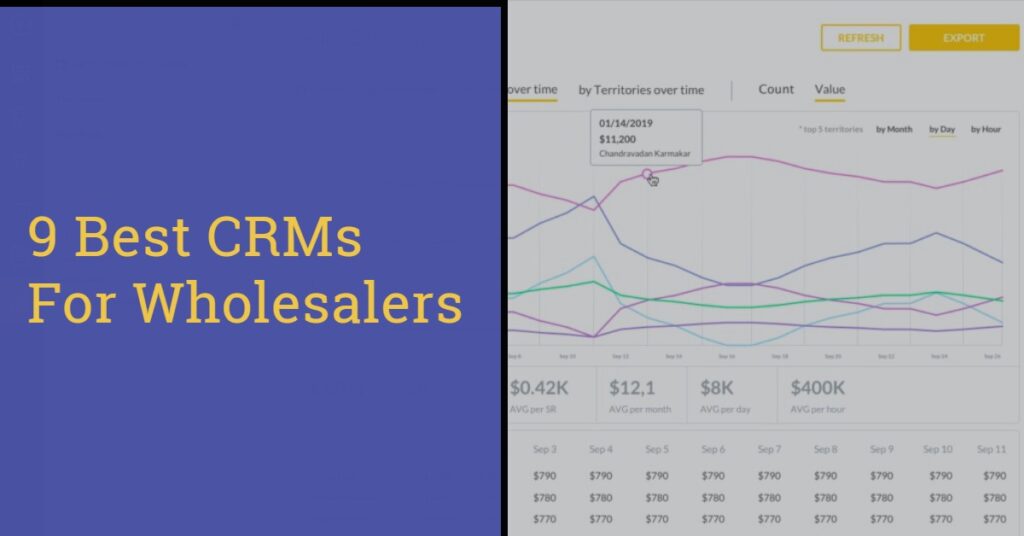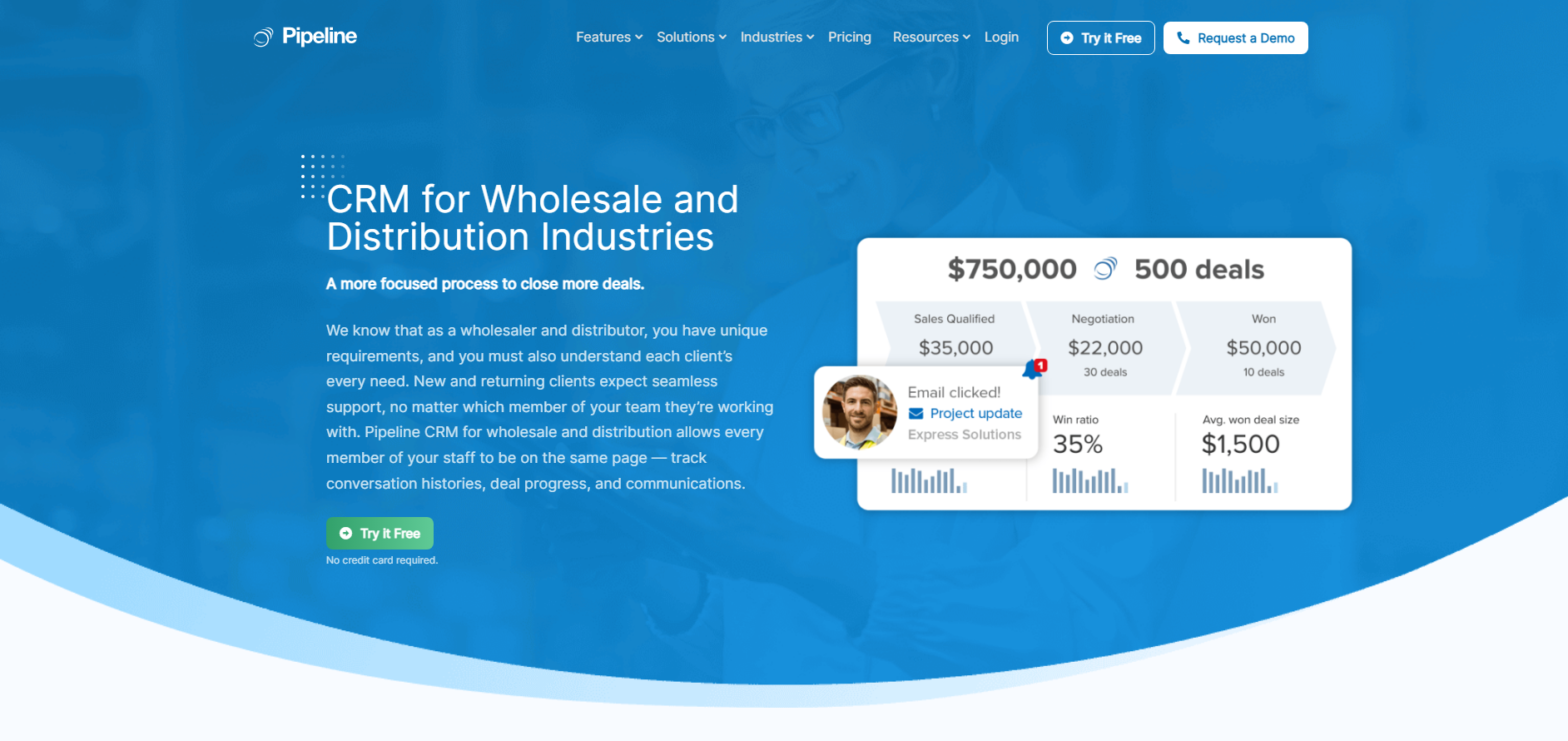Embarking on the world of CRM Wholesale, we delve into the transformative capabilities of customer relationship management systems tailored specifically to the wholesale industry. Discover how CRM can revolutionize operations, elevate customer satisfaction, and propel your business to new heights.
Through the lens of practical examples, we unravel the intricacies of CRM, showcasing how it streamlines inventory management, simplifies order processing, and fosters enduring customer relationships. Prepare to be captivated as we explore the myriad benefits and strategies that empower wholesale businesses to thrive in the modern marketplace.
Customer Relationship Management (CRM) for Wholesale Businesses
Customer Relationship Management (CRM) systems are essential for wholesale businesses to manage customer interactions, streamline operations, and improve profitability. Specifically designed CRM systems for wholesale businesses offer tailored features that cater to the unique challenges and opportunities in the industry.
Implementing a CRM system in a wholesale business provides numerous benefits, including improved customer satisfaction, increased sales, and enhanced operational efficiency. By centralizing customer data, automating tasks, and providing real-time insights, CRM systems empower wholesale businesses to build stronger relationships with their customers and drive growth.
Benefits of CRM for Wholesale Businesses
- Centralized Customer Data:CRM systems provide a single, comprehensive view of all customer interactions, including purchase history, communication records, and support requests.
- Automated Tasks:CRM systems can automate repetitive tasks such as order processing, inventory management, and customer communication, freeing up sales teams to focus on building relationships and generating revenue.
- Real-Time Insights:CRM systems provide real-time data on customer behavior, sales performance, and inventory levels, enabling businesses to make informed decisions and respond quickly to market changes.
- Improved Customer Satisfaction:By providing personalized experiences, resolving issues promptly, and tracking customer preferences, CRM systems help businesses improve customer satisfaction and loyalty.
- Increased Sales:CRM systems provide sales teams with valuable insights into customer needs and preferences, enabling them to tailor their sales strategies and increase conversion rates.
- Enhanced Operational Efficiency:By streamlining processes and automating tasks, CRM systems reduce operational costs and improve productivity.
Features of a Wholesale-Specific CRM

Wholesale businesses face unique challenges that require specialized CRM capabilities. A wholesale-specific CRM can streamline operations, improve efficiency, and enhance customer relationships.
Key features include:
Inventory Management
- Centralized inventory tracking across multiple locations and channels
- Real-time inventory updates to prevent overselling and improve order fulfillment
- Automated inventory replenishment to ensure optimal stock levels
Order Processing
- Streamlined order entry and processing to reduce errors and speed up delivery
- Integration with shipping carriers for real-time tracking and automated shipping notifications
- Automated invoice generation and payment processing to improve cash flow
Customer Relationship Tracking
- Centralized customer data management to track interactions, preferences, and purchase history
- Personalized communication channels to build strong relationships and increase customer loyalty
- Automated follow-up and reminder systems to nurture leads and convert them into loyal customers
Challenges of Implementing a CRM in Wholesale

Implementing a Customer Relationship Management (CRM) system in a wholesale business can bring significant benefits, but it also presents certain challenges that need to be addressed to ensure a successful implementation.
Common challenges include data integration, user adoption, and cost considerations. To overcome these challenges, it is essential to have a well-defined implementation strategy, effective communication, and ongoing support.
Data Integration
- Data integration is a crucial aspect of CRM implementation, as it involves combining data from multiple sources, such as ERP systems, spreadsheets, and legacy databases.
- Challenges in data integration can arise due to data inconsistencies, duplicate entries, and lack of standardization.
To address these challenges, it is important to establish a data integration strategy that includes data cleansing, data mapping, and data governance processes.
User Adoption
- User adoption is another key factor that can impact the success of a CRM implementation.
- Challenges in user adoption can occur due to resistance to change, lack of training, and poor user interface design.
To overcome these challenges, it is essential to involve users in the implementation process, provide comprehensive training, and ensure that the CRM system is user-friendly and aligns with their workflows.
Cost Considerations
- Cost is a significant consideration when implementing a CRM system, as it involves not only the initial purchase cost but also ongoing maintenance and support costs.
- Challenges in cost considerations can arise due to budget constraints and the need to justify the return on investment (ROI).
To address these challenges, it is important to conduct a thorough cost-benefit analysis, identify potential cost-saving opportunities, and secure buy-in from stakeholders on the value of the CRM investment.
Benefits of CRM for Wholesale Sales Teams: Crm Wholesale
In the fast-paced and competitive wholesale industry, empowering sales teams with the right tools is crucial for success. A CRM system acts as a central hub for managing customer relationships, providing sales teams with real-time data, streamlined workflows, and automated processes.
This empowers them to enhance productivity, build stronger relationships, and drive sales growth.
One of the key benefits of CRM for wholesale sales teams is the ability to access real-time customer data. With a comprehensive view of customer interactions, sales reps can gain insights into customer preferences, purchase history, and communication channels. This empowers them to tailor their sales strategies, offer personalized recommendations, and build lasting relationships.
CRM systems also provide robust sales pipelines that help sales teams track the progress of opportunities from lead generation to close. By visualizing the sales process, sales reps can identify bottlenecks, prioritize leads, and allocate resources effectively. Automated workflows further streamline the sales process by automating repetitive tasks such as lead assignment, follow-up emails, and order processing, freeing up sales reps to focus on high-value activities.
Increased Sales Productivity
By providing real-time data, streamlined workflows, and automated processes, CRM systems significantly increase sales productivity. Sales reps can spend less time on administrative tasks and more time engaging with customers, building relationships, and closing deals.
Improved Customer Relationships
CRM systems foster stronger customer relationships by providing a central repository for customer interactions. Sales reps can access a complete history of communications, preferences, and purchase history, enabling them to deliver personalized experiences and build trust.
Return on Investment (ROI) of CRM for Wholesale Businesses

Implementing a CRM system can bring substantial return on investment (ROI) for wholesale businesses. By streamlining processes, improving customer service, and increasing sales, CRM systems can help businesses drive revenue and reduce costs.
Financial Benefits of CRM in Wholesale, Crm wholesale
- Increased sales:CRM systems provide sales teams with a centralized view of customer data, allowing them to track interactions, identify opportunities, and close deals more efficiently.
- Improved customer service:CRM systems enable businesses to track customer interactions across multiple channels, ensuring that customers receive consistent and personalized support.
- Reduced costs:CRM systems automate many tasks, such as lead generation, marketing campaigns, and order processing, freeing up staff to focus on higher-value activities.
Case Studies
Numerous wholesale businesses have experienced significant ROI after implementing CRM systems:
- A wholesale distributor of electrical supplies increased sales by 15% after implementing a CRM system that improved customer relationship management and sales tracking.
- A food wholesaler reduced customer churn by 10% after implementing a CRM system that provided real-time insights into customer behavior and preferences.
Closing Notes
In conclusion, CRM Wholesale emerges as an indispensable tool for businesses seeking to optimize operations, enhance customer experiences, and drive profitability. By embracing the power of CRM, wholesale enterprises can unlock a wealth of opportunities, empowering sales teams, improving decision-making, and securing a competitive edge in the ever-evolving landscape of commerce.
FAQ Resource
What are the key benefits of CRM for wholesale businesses?
CRM empowers wholesale businesses with centralized customer data, streamlined operations, enhanced sales productivity, and improved customer satisfaction.
How can CRM improve customer relationships in the wholesale industry?
CRM fosters stronger customer relationships by providing a comprehensive view of customer interactions, enabling personalized communication and proactive support.
What are the common challenges faced when implementing CRM in wholesale?
Challenges include data integration, user adoption, and cost considerations. However, with careful planning and a phased approach, these challenges can be effectively addressed.
